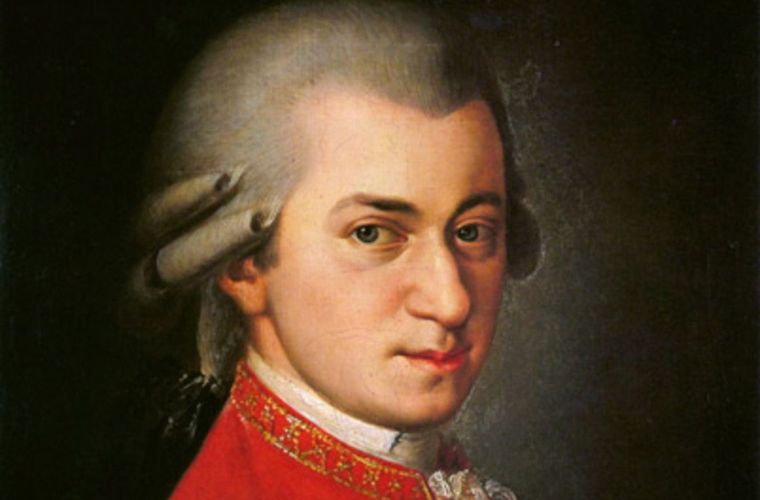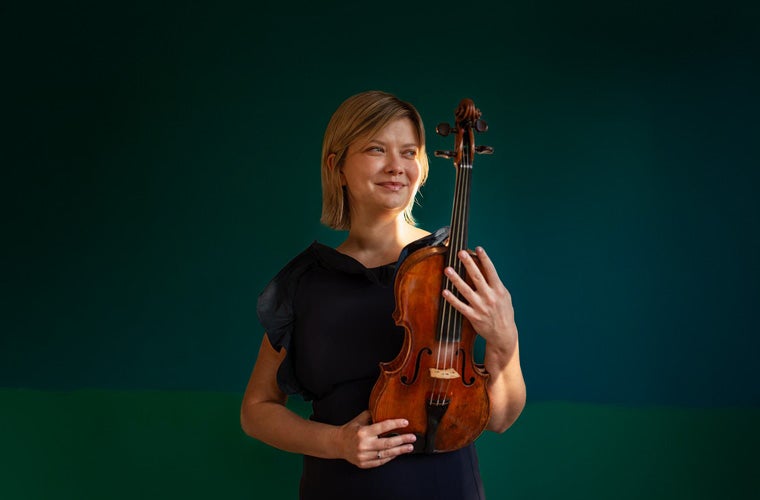
Wolfgang Amadeus Mozart
1756 - 1791
Biography
Wolfgang Amadeus Mozart was born in Salzburg in modern-day Austria, but at the time was the capital of a small independent Archbishopric within the Holy Roman Empire. He was baptized on the day after his birth at St. Rupert's Cathedral as Johannes Chrysostomus Wolfgangus Theophilus Mozart.
Mozart's musical ability started to become apparent when he was a toddler. He was the son of Leopold Mozart, one of Europe's leading musical pedagogues, whose influential textbook Versuch einer gründlichen Violinschule ('Essay on the fundamentals of violin playing') was published in 1756, the same year as Mozart's birth. Mozart received intensive musical training from his father, including instruction in both the piano and violin Musically, he developed very rapidly and began to compose his own works at the age of five.
Leopold soon realized that he could earn a substantial income by showcasing his son as a Wunderkind in the courts of Europe. Mozart's older sister, Maria Anna, nicknamed 'Nannerl', was a talented pianist and often accompanied her brother on Leopold's tours. Mozart wrote a number of piano pieces, in particular duets and duos, to play with her. On one occasion when Mozart became ill, Leopold expressed more concern over the loss of income than over Mozart's well-being. Constant travel and cold weather may have contributed to his subsequent illness later in life.
During his formative years, Mozart completed several journeys throughout Europe, beginning with an exhibition in 1762 at the Court of the Prince of Bavaria in Munich, then in the same year at the Imperial Court in Vienna. A long concert tour soon followed, (three and a half years) which took him with his father to the courts of Munich, Mannheim, Paris, London, The Hague, again to Paris, and back home via Zurich, Donaueschingen, and Munich. They went to Vienna again in late 1767 and remained there until December 1768.
After one year spent in Salzburg, three trips to Italy followed: From December 1769 to March 1771, August to December 1771, and October 1772 to March 1773. During the first of these trips, Mozart met G.B. Martini in Bologna, and was accepted as a member of the famous Accademia Filarmonica. A highlight of the Italian journey, which is now an almost legendary tale, occurred when he heard Gregorio Allegri's Miserere once in performance, then wrote it out in its entirety from memory, only returning a second time to correct minor errors.
In September of 1777, accompanied only by his mother, Mozart began a tour of Europe that included Munich, Mannheim, and Paris, where she died.
During his trips, Mozart met a great number of musicians and acquainted himself with the works of other great composers: Amongst them were J.S. Bach, G.F. Handel, and Joseph Haydn. Even non-musicians caught his attention: He was so taken by the sound created by Benjamin Franklin's glass harmonica, he composed several pieces of music for it.
In 1781, Mozart visited Vienna in the company of his employer, the harsh Prince-Archbishop Colloredo, and had a falling out with him. According to Mozart's own testimony, he was dismissed literally 'with a kick in the seat of the pants.' Despite this, Mozart chose to settle and develop his career in Vienna after its aristocracy began to take an interest in him.
On August 4, 1782, he married Constanze Weber against his father's wishes. He and Constanze had six children, of whom only two survived infancy. Neither of these two, Karl Thomas (1784–1858) or Franz Xaver Wolfgang (1791–1844), married or had children.
1782 was an auspicious year for Mozart's career; his opera The Abduction from the Seraglio was a great success, and he began a series of concerts at which he premiered his own piano concertos as conductor and soloist.
As an adult, Mozart became a Freemason and worked fervently and successfully to convert his father before his death in 1787. His late opera The Magic Flute includes Masonic themes and allegory. He was in the same Masonic Lodge as Joseph Haydn.
Mozart's life was fraught with financial difficulty and illness. Often, he received no payment for his work, and what sums he did receive were quickly consumed by his extravagant lifestyle.
Mozart spent the year 1786 in Vienna in an apartment which may be visited today at Domgasse 5 behind St. Stephen's Cathedral; it was here that Mozart composed Le nozze di Figaro in 1786.
Mozart's final illness and death are difficult scholarly topics, obscured by Romantic legends and replete with conflicting theories. Scholars disagree about the course of decline in Mozart's health--particularly at what point Mozart became aware of his impending death, and whether this awareness influenced his final works. The Romantic view holds that Mozart declined gradually, and that his outlook and compositions paralleled this decline. In opposition to this, some contemporary scholarship points out correspondence from Mozart's final year indicating that he was in good cheer, as well as evidence that Mozart's death was sudden and a shock to his family and friends.
The actual cause of Mozart's death is also a matter of conjecture. His death record listed 'hitziges Frieselfieber' ('severe miliary fever'), a description that does not suffice to identify the cause as it would be diagnosed in modern medicine. In fact, dozens of theories have been proposed, which include trichinosis, mercury poisoning, and rheumatic fever. The contemporary practice of bleeding medical patients is also cited as a contributing clause.
Mozart's death occurred while he was working on his final composition, the Requiem.
According to popular legend, Mozart was penniless and forgotten when he died, and was buried in a pauper's grave. In fact, though he was no longer as fashionable in Vienna as he had once been, he continued to have a well paid job at court and receive substantial commissions from more distant parts of Europe, Prague in particular. Many of his begging letters survive, but they are evidence not so much of poverty than his ability to always spend more than he earned. He was not buried in a mass grave but a regular communal grave according to the 1783 laws.
In 1809, Constanze married Danish diplomat Georg Nikolaus von Nissen (1761–1826). Being a fanatic of Mozart, he edited vulgar passages out of many of the composer's letters and wrote a Mozart biography.
Source: 8 Notes
Featured Events
Mozart's Jupiter Symphony
- Symphony No. 41, "Jupiter"Mozart
- Violin Concerto No. 5, "Turkish"Mozart
- Con brioJörg Widmann
